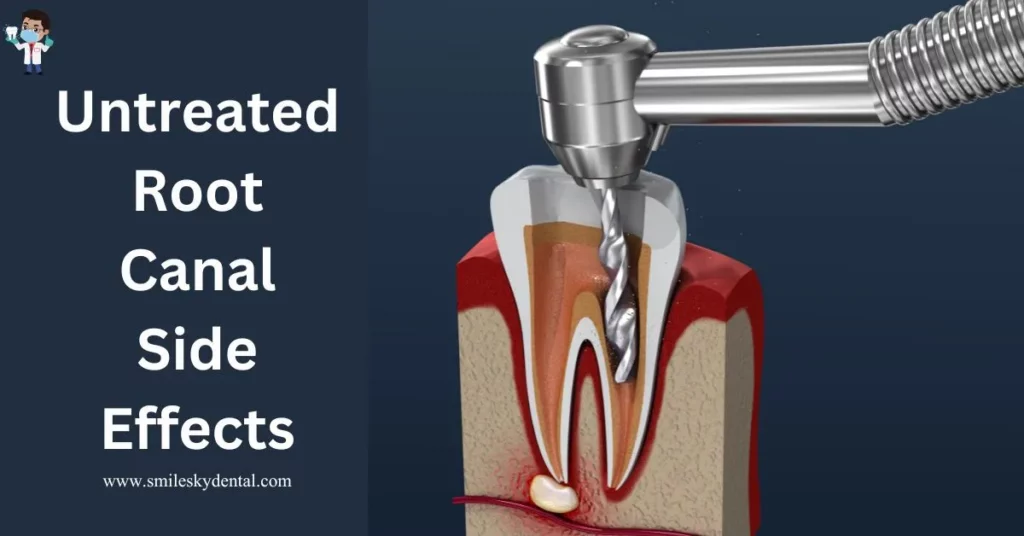When a dentist recommends a root canal, it’s critical to understand the consequences of an untreated root canal side effects. Delaying or skipping a necessary root canal operation might have a number of negative consequences for your dental health.
Let’s discuss the potential consequences of not having a root canal, how long you can go without treatment, and when a root canal may no longer be a feasible option.
Consequences of Not Getting a Root Canal
Persistent Pain and Discomfort
Untreated root canal infections can cause tooth pain and discomfort for a long time. The discomfort may grow and become severe over time, interfering with your everyday activities and quality of life.
Spread of Infection
The infection within the root canal has the potential to spread to surrounding tissues such as the gums, jawbone, and adjacent teeth. This can result in dental abscesses, bone loss, and probable tooth loss.
Tooth Loss
If the infection is not treated, it might proceed to the point where the affected tooth is irrevocably ruined. Extraction may be the sole viable choice in such circumstances to avoid future difficulties.
Systemic Health Concerns
Untreated root canal infections might have systemic health consequences in some cases. Bacteria from an infected tooth can enter the bloodstream and potentially influence other regions of the body, potentially contributing to systemic health problems.
Timelines for Untreated Root Canal
The timeline for untreated root canal infections varies depending on a number of factors, including the severity of the illness and the individual’s circumstances.
However, it is critical to address the problem as soon as possible to avoid further issues. In general, the implications of failing to obtain a root canal may include:
Progression of Infection

Without treatment, the infection can spread and cause more harm to the tooth and surrounding structures. The rate of advancement can vary, but it is best not to put off treatment.
Increased Discomfort
Delaying a root canal might cause more pain and discomfort as the infection spreads. This can make symptoms more difficult to manage and may necessitate more invasive treatment alternatives.
Risk of Tooth Loss
If the infection worsens and threatens the tooth’s integrity, extraction may be required. Following the loss of a tooth, other dental operations, such as dental implants or bridges, may be required to restore functionality and aesthetics.
When a Root Canal Is Not Possible- Special Cases
If the infection has spread widely or the tooth is significantly damaged, a root canal may no longer be a viable treatment choice. A root canal may become unfeasible due to the following factors:
Advanced Decay

Extensive decay that goes beyond the root canal chamber may make it difficult to treat the tooth adequately with a root canal operation.
Fractured Tooth
If the tooth is significantly fractured or cracked, it may be too weak to support a successful root canal treatment.
Insufficient Tooth Structure
Tooth structural deficiency caused by massive fillings or past dental operations may jeopardize the tooth’s long-term prognosis for a root canal.
FAQ’s
How long can you go without getting a root canal?
The timing of a root canal is determined by the severity of the issue. It is advisable not to postpone treatment, but if necessary, consult with your dentist to decide the ideal time frame.
What happens if you don’t get a root canal?
You might be wondering how long can you delay a root canal. If a root canal is not performed, the infection in the tooth might progress, causing more severe pain, the creation of an abscess, and the loss of the tooth. It is critical to address the problem as soon as possible.
How long can a root canal go untreated?
Untreated root canals can have catastrophic effects. The infection has the potential to spread, resulting in increased pain, probable harm to nearby teeth and tissues, and the possibility of tooth loss.
What happens if I don’t get a root canal?
Without a root canal, the infection can spread, causing discomfort, tooth loss, and consequences that may necessitate more expensive dental treatment.
Can not getting a root canal kill you?
While untreated dental issues can lead to serious complications, it is rare for not getting a root canal to directly result in death. However, it’s important to understand the potential risks and consequences of avoiding necessary dental treatment.
Can I wait a month before getting a root canal?
It is generally not advisable to put off obtaining a root canal for an extended period of time. The infection can worsen, producing additional discomfort and perhaps serious problems. It is advisable to check with your dentist to identify the ideal time frame.
When is a root canal not possible?
A root canal may not be possible in some circumstances if the tooth is substantially injured or the infection has seriously harmed the tooth’s structure. Your dentist will assess the situation to decide the best course of therapy.
Conclusion
Delaying or postponing essential root canal treatment might result in a number of hazards and implications for your dental health. Untreated root canal side effects can impair your daily life. That’s why it is critical to understand the potential consequences of not getting a root canal and to address any dental concerns as soon as possible.
Consultation with a dentist is essential for a complete evaluation of your specific situation and to determine the best course of action. That’s where we come in. Smile Sky Family Dental provides expert dental counseling and treatment. Our team of specialists can provide regular dental treatment to help you keep your natural teeth and your overall oral health.


